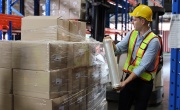ADBA warns DECC could ‘kill off’ AD projects
 Government proposals to restrict support for certain plant sizes and feedstocks will ‘kill off’ promising anaerobic digestion projects, according to the Anaerobic Digestion and Bioresources Association (ADBA).
Government proposals to restrict support for certain plant sizes and feedstocks will ‘kill off’ promising anaerobic digestion projects, according to the Anaerobic Digestion and Bioresources Association (ADBA).
The claim comes in response to a Department of Energy & Climate Change (DECC) consultation issued last week (26 May) that proposed revised support levels for AD and micro-combined heat and power (mCHP) technologies currently eligible for the Feed-in Tariff (FiT) scheme.
Actions suggested by the consultation include decreased tariffs, amended degression levels, and a revision to the cap for micro-combined heat and power. It also proposes other measures to ensure the scheme is ‘more closely aligned’ with other DECC policy measures, including restrictions of feedstock used in plants.
Proposals
The FiT scheme was designed to incentivise the deployment of small-scale renewables, allowing generators to benefit from bill savings, an export tariff for electricity exported to the grid and a generation tariff.
The DECC consultation document explains how under the FiT scheme, AD has been successfully developed in the UK, stating that when the scheme was launched in 2010, the government projected 100 installations equating to 160 million watts (MW) of installed capacity by 2020/2. By the end of March 2016, the number of installations accredited under the FiT scheme was 250, with an installed capacity of 177 MW. In contrast, mCHP has not seen a sustained level of deployment, with only 501 installations deployed since the scheme started.
This consultation looks at the AD industry in particular and proposes, from January 2017, to remove generation tariffs for plants generating over 500 kilowatts (kW), stating that such plants receive gates fees of around £20 per tonne and that subsequently they are ‘able to make sufficient revenues to make the deployment of the plant viable and achieve a 9.1 per cent rate of return without support from the generation tariff’.
DECC also suggests an adjusted default degression on the tariff, with contributions to 250-500 kW plants falling from 5.52 pence per kilowatt hour (p/kWh) in January 2017 to 5.32 p/kWh in January 2019.
Sustainability criteria on feedstock and payment restrictions based on feedstock type are also put forward in the document. Under these proposals, new AD installations would have to meet criteria that reduces the risks of generating energy from material that does not achieve a substantial greenhouse gas saving, or has a detrimental impact on land with a high ecological value, and would receive restricted payments for electricity generated from biogas that is derived from feedstock that is not waste or residues.
‘Completely unjustified’ plans threaten projects
Responding to the proposals set out by DECC, Charlotte Morton, Chief Executive of ADBA, said that the “completely unjustified” consultation proposals show the department’s “fundamental lack of ambition for AD and community-scale renewables” and argued that removing support for AD would hinder the meeting of DECC targets.
In a statement released last week, she said: “Removing support for new plants above 500kW is completely unjustified and will kill off projects which could otherwise have delivered DECC’s objectives while representing good value for money.”
Proposals to restrict plant sizes and feedstocks, she added, will “make it even harder to deploy viable AD plants using waste, crops or agricultural residues”.
“The government needs baseload electricity to ensure energy security, and technologies that reduce emissions from agriculture and waste to meet our carbon budgets. AD can deliver all of that, at scale, now – but only with the right support.”
The DECC consultation closes on 7 July, and Morton says that ADBA members will be engaged to put forward their views: “We will be working with our members to put together a strong response to this consultation, and making the wider case for supporting anaerobic digestion to cut carbon, deliver energy security and recycle critical nutrients.”
The DECC ‘Review of support for Anaerobic Digestion and micro-Combined Heat and Power under the Feed-in Tariffs scheme’ consultation can be downloaded from the department’s website. 




